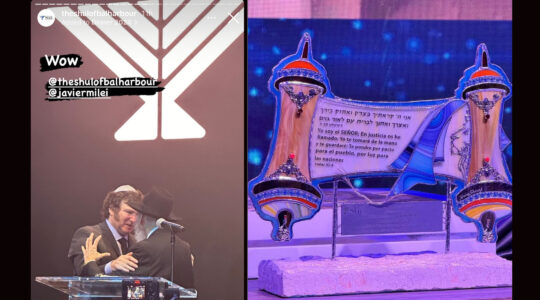PRAGUE, Dec. 11 (JTA) — Poland’s education minister has been fighting for a year to prove that he and his party, the ultra-conservative League of Polish Families, have rejected anti-Semitism.
But two recent incidents connecting the league with neo-Nazis reveal the uphill battle Roman Giertych faces and suggest that more needs to be done to eradicate xenophobia from Polish political life.
In a video that circulated on the Internet in late November, league supporters were seen shouting “Sieg Heil!” at a neo-Nazi rally in southern Poland.
Members of the league’s All Polish Youth association, a so-called club of patriots, are accused of organizing and participating in the 2004 rally first revealed by the Polish daily newspaper Dziennik. The video, which shows attendees celebrating in front of a massive burning swastika, has drawn international media attention.
Giertych, honorary chairman of All Polish Youth, has called for the state prosecutor to investigate the rally, since propagating Nazi ideology is illegal in Poland.
A few days after the video surfaced, another leading Polish daily, Gazeta Wyborcza, ran photos showing the league’s deputy head, Wojciech Wierziejski, at a 2002 concert of Polish neo-Nazi and white supremacist rock bands.
Wierziejski refused to speak to the media about the incident. He said on his Web site that he was merely listening to “patriotic music.”
In the 1990s, according to Polish journalists, Wierziejski wrote that “international Jewry was the enemy of the Polish national movement.”
All of which makes the job tougher for Giertych, who repeatedly has denounced anti-Semitism since the Catholic-based league joined the government coalition last year after garnering 8 percent of the vote in national elections.
The league is the post-communist incarnation of Endecja, a political movement between the two world wars whose members attacked university students as part of an openly anti-Semitic party platform.
Giertych, who also is deputy prime minister, emphasized in a July interview with JTA that he had cleansed his party of racism, and called himself a friend of Israel. He also attended a May commemoration of the 1941 Jedwabne pogrom, an event some of his supporters still insist was carried out by Germans, although in fact it was carried out by Poles.
“Nobody makes anti-Semitic statements, because if they do they will be kicked out from our party the next day,” Giertych told JTA in the interview.
But Marek Edelman, the last survivor of the Warsaw Ghetto uprising, called for the league to be banned after he viewed the video of the neo-Nazi rally.
Members of the All Polish Youth for years have been labeled skinheads and racists. They have physically assaulted marchers in gay-rights parades and reportedly been photographed using Nazi salutes.
While not everyone wanted to believe the labels, the giant swastika in the video left little room for doubt.
Even Polish Prime Minister Jaroslaw Kaczynski, who has defended his Law and Justice party’s cooperation with the league on numerous occasions, was shocked. He told reporters that if there were links between the league and those attending the neo-Nazi rally, “this would be very bad.”
“These kinds of gestures in a country where 6 million citizens were murdered” by Nazi Germany during World War II “is something extremely upsetting,” Kaczynski said.
Rafal Pankowski of Never Again, a Polish anti-racism group, said Poles are fed up with the league’s youth wing.
“This video is the final straw,” he said. “It’s like All Polish Youth is a black hole that draws in the worst possible people.”
Pankowski said the organizer of the neo-Nazi party was an All Polish Youth member who ran for Parliament on the league ticket in 2005, although he was expelled from the party when his views were publicized. He later ran for municipal office on the Law and Justice ticket, and when party officials learned of his past, they said they assumed he had been screened by the league for neo-Nazi sympathies.
Then there was Piotr Farfal, the All Polish Youth and league member who penned anti-Jewish slogans for a neo-Nazi magazine 10 years ago. His writings were discovered after he was appointed deputy director of Polish state television this year.
Still, Krzysztof Bosak, a member of Parliament and current head of All Polish Youth, dismissed the notion that the group was a haven for fascists.
“We’re even the object of ridicule on all kinds of nationalist Internet discussion groups,” he told the Polish edition of Newsweek earlier this month. “We’re laughed at as the good boys, unable to stir any serious trouble.”
Still, what scares Pankowski is the company the league and the All Polish Youth keeps, not necessarily their statements.
He points out that the head of the league’s parliamentary delegation, Piotr Slusarczyk, an All Polish Youth member, formerly managed his brother’s band, a notorious skinhead rock group and purveyor of racist lyrics.
If charges are pressed against the All Polish Youth in connection with the neo-Nazi rally, it’s likely that calls to ban the group will grow louder.
But Wojciech Szacki, a reporter for the liberal Gazeta Wyborcza who covers the league and its youth wing, said sometimes it’s better to have “ugly things” out in the open than underground.
“I guess we take inspiration from America, where you had civil-rights activists defending the right of the Ku Klux Klan to march,” Szacki said.
The free-speech argument irks Piotr Kadlcik, chairman of the Union of Jewish Religious Communities in Poland.
“The government has come to power with the promise of weeding out former communists with no account for how long ago they violated people’s rights,” Kadlcik said. “They should apply the same tough standard to the far right.”
Racism still plagues Polish politics
Advertisement





